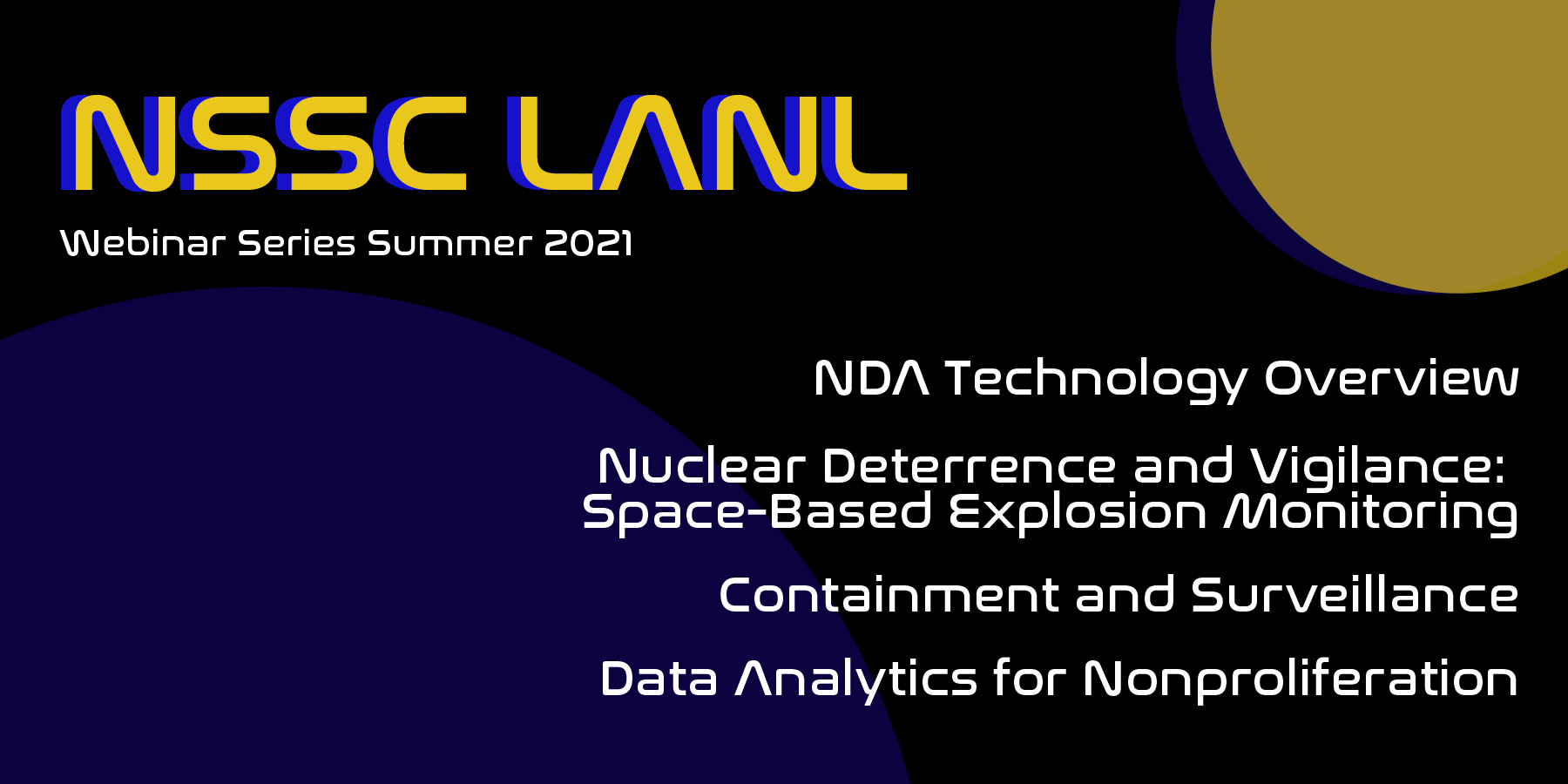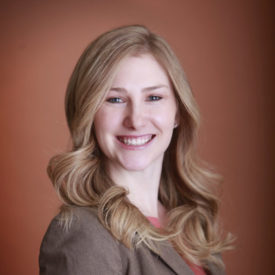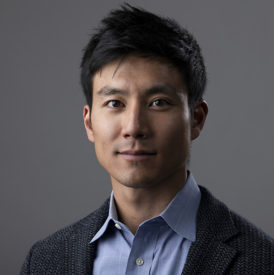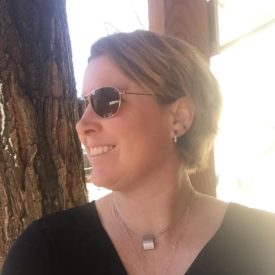
TO RECEIVE THE CALL IN INFORMATION AND RECEIVE INFREQUENT REMINDER EMAILS FOR THIS TALK SERIES, PLEASE REGISTER HERE.
Upcoming events:

Dr. Alexis Trahan presents “NDA Technology Overview”
July 1st, 2021 – 3 – 4 pm MT
Abstract: The International Atomic Energy Agency (IAEA) is responsible for ensuring the timely detection of diversion of nuclear material from peaceful nuclear programs to illicit weapons programs. This mission is accomplished through implementation of Nuclear Safeguards. At Los Alamos National Laboratory (LANL), we support the IAEA in this crucial mission through development of nondestructive assay (NDA) technology and analysis methods. This talk will provide an introduction to International Safeguards and an overview of NDA technology and methodologies for verification, as well as highlight current NDA and Safeguards research taking place at LANL.
Bio: Dr. Alexis Trahan is an R&D Engineer with the Safeguards Science and Technology group and the Senior Project Lead for NA-241 International Nuclear Safeguards at LANL. She received her B.S. in nuclear engineering from UC Berkeley in 2011 and her M.S. and Ph.D. from the University of Michigan in 2012 and 2016 respectively. Alexis works on development of detection instrumentation and analytical methods with an emphasis on neutron detection for nonproliferation. She is currently developing and testing technologies for used power reactor and research reactor fuel characterization. Alexis is also actively engaged with the Nuclear Compliance Verification program as the LANL Project Lead.
—

Tony Shin presents “Nuclear Deterrence and Vigilance: Space-Based Explosion Monitoring”
July 15, 3-4 PM MT
Abstract: Space Nuclear Detonation Detection (SNDD) is a core aspect of the United States Nuclear Detonation Detection System (USNDS), where the goal is to detect, locate, and report on nuclear detonations for treaty verification. This talk will provide an overview on the history, mission, challenges, and ISR’s involvement in the SNDD mission space that spans from fundamental research & development to supporting current operational sensing systems.
Bio: Dr. Tony Shin is a staff scientist with the Space Science and Applications Group (ISR-1) in the Intelligence and Space Research Division at LANL. He received his Ph.D. in Nuclear Engineering from the University of Michigan in 2019, where his thesis work focused on fast-neutron multiplicity counting techniques and system design for nuclear safeguards applications. He joined ISR-1 as a Director’s Postdoctoral Fellow in 2019, where his work involved machine learning algorithm development for dynamic optimal motion planning of mobile sensor networks. His current research focuses on algorithm development, simulation & modelling, and system design for supporting current and future SNDD missions.
—

Dr. Heidi Smartt presents “Containment and Surveillance”
July 29, 3-4 PM MT
Abstract: This talk explains the relationship of Containment/Surveillance with the Nuclear Nonproliferation Treaty (NPT), provides definitions and considerations for Containment/Surveillance, and provides examples of technologies that are currently deployed.
Bio: Dr. Heidi A. Smartt is a Distinguished Member of the Technical Staff in the International Safeguards and Engagements department at Sandia National Laboratories in Albuquerque, New Mexico. She received her Ph.D. in Electrical Engineering from the University of New Mexico in 2005 with an emphasis in Applied Electromagnetics. Heidi has worked in nuclear nonproliferation since 1997 with early work focused on remote monitoring systems and information assurance for communication systems in international safeguards. While working on her Ph.D., Heidi gained experience in spectroscopy and imaging systems, eventually completing her dissertation on methods to improve the detection of targets with both spatial and spectral characteristics in hyperspectral imagery. Her more recent research interests have involved tags, tamper-indicating devices, tamper-indicating enclosures, and Containment/Surveillance approaches and technologies.
—

Paul Mendoza “Data Analytics for Nonproliferation”
August 12, 3-4 PM MT
Abstract: Nuclear safeguards have changed dramatically since initial implementation. Regulatory agencies in the early years have focused on improving detector systems to collect better and more reliable data for verification. The amount of nuclear facilities and accountable material is continuously increasing while budget remains relatively static. Leveraging advancements in coding architecture could improve automation, incorporate new ways to analyze collected data, and introduce more persistent data collection. Further, advancements in hardware, increased computing speeds, and the increased availability of different types of sensors open up new avenues for safeguards that were not possible prior. To keep up with and get ahead of nuclear regulatory mandates, innovations and improvements to the status quo are required and are currently being pursued. The professionals working in this field have encountered an ocean of data and new challenges but individuals, teams, and organizations have not sunk or drowned in the flood, they are relearning how to swim.
Bio: Paul Mendoza is a Texas A&M PhD nuclear engineer who works in the non-proliferation division at Los Alamos Laboratory. For the past five years he has contributed towards improving safeguards by providing applications to process and analyze safeguards data, performing simulations of neutron detector systems for uncertainty and dead-time estimates, and teaching in a NDA school house as a neutron instructor. Paul solves problems in a way similar to a classical nuclear engineer but also has some capability to train algorithm architectures to classify or predict. He naïvely believes in a world without nuclear weapons, and that automation and streamlining human work flow can lead to great grains for mankind but could ultimately be their proverbial brick of Babel’s tower. He enjoys long walks on the beach, is continually learning in an ever changing landscape, and is excited about the future of safeguards, please welcome, Paaaaaul Mendoooooooza (ahhhhh, ahhhh the crowd goes wild!)
